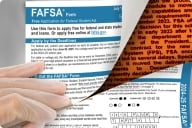You have /5 articles left.
Sign up for a free account or log in.
New research by a scholar affiliated with Stanford University challenges much of the conventional wisdom about the Advanced Placement (AP) program and how it affects students’ preparedness for higher education.
The study, by Denise Pope, a senior lecturer at Stanford's Graduate School of Education and co-founder of the advocacy group Challenge Success, analyzes the accuracy of four commonly encountered talking points relating to the AP program:
- “The AP program gives students several advantages in terms of college.”
- “The AP program helps to narrow achievement gaps.”
- “AP programs enrich students’ high school experiences.”
- “Schools with AP programs are better than those without AP programs.”
The first of these assertions comes in for particular scrutiny, specifically the sub-claim that AP classes increase a student’s chances of academic success in college; “[A] closer look at studies [on the subject] reveals some potential problems with the notion of causality,” reads the report. “Studies that simply establish that students who are involved with the AP program in high school perform better in college do not necessarily provide proof that the AP program caused the students to be successful in college.” Students who have the motivation and study habits to take AP classes in the first place have those same attributes upon reaching college, argues the report, “[s]o how can we know if it was the program that caused these students to do better in college?”
The notion of AP classes and scores as all-important to college admissions also came under the microscope; the study found that while the majority of colleges use AP exams as a factor in admissions, the way the scores are used varies widely among institutions.
In addition, weighting AP scores too heavily in the admissions process is “potentially problematic because, as previously discussed, the research isn’t clear on whether AP experience alone increases the probability of college success,” along with the fact that “students from rural, small, or lower socioeconomic status schools tend to have less access to AP courses.”
“Even when the studies did look at free and reduced lunch or socioeconomic status of the kids … they still in many cases did not find a correlation between AP and college success,” Pope said in an interview. “When they do drill down and try to compare these groups on a fair and rigorous basis, it’s very hard to show causation.”
The study also found that the introduction of AP courses in inner-city schools in Jacksonville, New York, Detroit and Philadelphia has not had the desired effect. “The most probable explanation for the lackluster results of expansion efforts such as these is that too often, the AP courses were introduced without the necessary attention to preparation and prerequisites,” says the report. While there have been occasions when the introduction of the AP program has resulted in a marked improvement in student performance, the study found that these improvements had often been accompanied by other, unrelated factors. Thus, the report concludes, “if the AP program is to be used effectively to help make a difference in underserved schools, it will need to be part of a broader initiative.”
Pope specifically cited successful initiatives in Texas and Massachusetts that incorporate AP but "are working with kids early on, they’re doing professional development with teachers, and they’re providing other services to students," she said. "They’re not just plopping in the AP… it’s a full reform initiative,” she said, “and I’m guessing that’s why they’re seeing the positive results that we’re not seeing in other states where they’re just encouraging more students to take APs.”
The report also criticizes the idea of “teaching to the test.” Pope said that while “the College Board, to their credit, is trying to make changes in some of these courses,” a large percentage of AP assessments are “very heavy on memorization and content and less focused on skill acquisition.”
Lastly, the report discusses the perception that “a school’s AP offerings [are] an indicator of the school’s quality.” This is difficult to definitively conclude, the report says, because, once again, of the wide variability in application of the AP program in high schools. The report also cites an earlier study arguing that the presence of AP courses in a high school can siphon both quality educators and resources from non-AP courses, as well as result in much larger non-AP classes. “In these ways,” the report says, “the presence of the AP program may actually be a detriment to a school.”
Trevor Packer, the College Board’s senior vice president for AP and college readiness, could not be reached for comment on Monday. He has defended the AP program against such criticisms in the past, but has also acknowledged their validity; in 2011 he conceded that "for schools that are expanding access to AP among unprepared students, they are probably using resources that could be better used elsewhere." In 2010, he addressed the issue of memorization versus learning, saying that "if you’re spending all your time memorizing content, you’re not going to develop those fundamental skills.”








